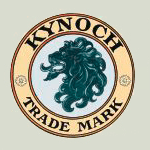Kynoch
 | |
| Private | |
| Industry | ammunition |
| Fate | Incorporated |
| Successor | ICI |
| Founded | 1862, Witton in Birmingham, United Kingdom |
| Founder | George Kynoch |
| Defunct | 1926 |
| Website |
www |
Kynoch was a manufacturer of ammunition, later incorporated into ICI but remaining as a brand name for sporting cartridges.
History
Kynoch was established in Witton in Birmingham in 1862 by Scottish entrepreneur George Kynoch when he opened a percussion cap factory in Witton.[1] In 1895 he built an explosives factory east of Shell Haven Creek, Essex (now known as Coryton). This opened in 1897, with an estate for employees called Kynochtown. Products included cordite, guncotton, gunpowder, and cartridges.[2] After World War I many of the UK ammunition and explosives manufacturers were brought together under Nobel Explosives to become Nobel Industries, which was a founding element of Imperial Chemical Industries Ltd (ICI) in 1926. Once Nobel Industries, including Kynoch Ltd, had merged to form ICI, the original Kynoch factory in Witton became the head office and principal manufacturing base of the "ICI Metals Division". Kynoch, along with names such as Eley, became brands of subsidiaries.
Kynoch, established a munitions factory on the north side of Arklow, Ireland. This factory employed several thousand workers during World War I, but closed shortly after it, all production being moved to South Africa. Seventeen workers were killed in an explosion there on 21 September 1917. It was believed that the plant was shelled by a German U-boat[3]
During the 1950s, the sound of test firing of munitions still occasionally shattered the peace over Witton, but with the standardization of cartridges across the Western powers and a general downturn in ammunition requirements, the sidelines in sporting cartridges were discontinued by Imperial Metal Industries (IMI) in 1970. IMI became independent of ICI in 1977, still producing rimfire and shotgun cartridges for the sporting markets. The more economically viable production of shotgun and rimfire ammunition continued. The Ammunition Division was incorporated separately as Eley Limited in 1983.

_-_front.jpg)
_-_back.jpg)
To manage publicity the company set up a private printing press brand, known as the Kynoch Press, which became ICI's house printing company and also did outside work.[4][5] It commissioned art from leading artists such as Eric Ravilious.[6] It closed in 1981.
See also
- John Sutton Nettlefold JP - former managing director
- Eley Brothers
- Corringham Light Railway
References
- ↑ Robert D. Beeman; John B. Allen (2005). Blue Book of Airguns. Blue Book Publications. p. 295. ISBN 1-886768-56-0.
- ↑ Henry W. Macrosty. (1907). The Trust Movement In British Industry. The Chemical Industries. (p. 166). Archived 2007-08-29 at the Wayback Machine. Batoche Books.
- ↑ Bourke, Edward (1998). Shipwrecks of the Irish Coast. 2. p. 195. ISBN 0952302713.
- ↑ "Kynoch Press". The Typographic Hub. Birmingham City University. Retrieved 27 October 2017.
- ↑ Archer, Caroline (2000). The Kynoch Press: The Anatomy of a Printing House, 1876-1981. London: British Library. ISBN 9780712347044.
- ↑ Drew, Kynoch (1940). "Kynoch Press Diaries". Art and Industry: 73–9. Retrieved 27 October 2017.
The Kynoch Press, as every printer knows, is an offshoot of that vast division of British commerce, Imperial Chemical Industries...the Kynoch Press has one of the most distinctive typographical repertories among printers in this country.
External links
| Wikimedia Commons has media related to Kynoch. |
- Kynamco
- A History of Kynoch Works
- Flickr album, collected by Mikey Ashworth